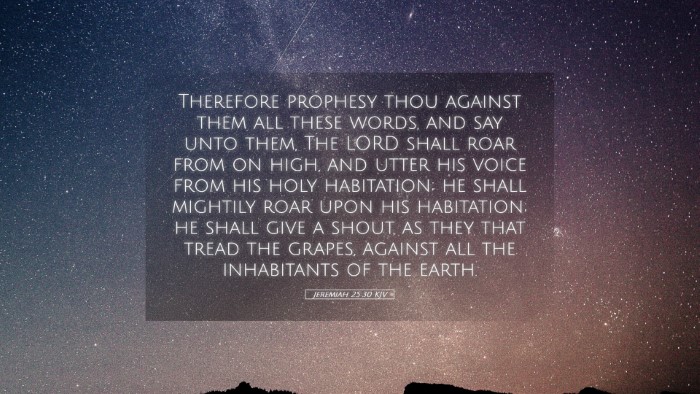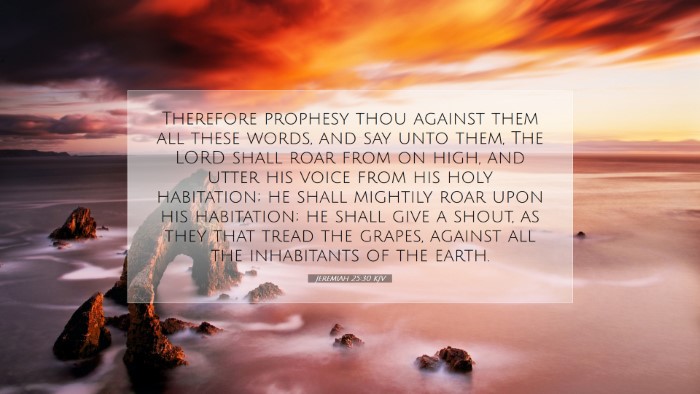Commentary on Jeremiah 25:30
Jeremiah 25:30 states:
"Therefore prophesy thou against them all these words, and say unto them, The Lord shall roar from on high, and utter his voice from his holy habitation; he shall mightily roar upon his habitation; he shall give a shout, as they that tread the grapes, against all the inhabitants of the earth."
Introduction
This verse captures the intense prophetic declaration of God's impending judgment against the nations. It serves as a moment of profound importance in Jeremiah's ministry, emphasizing both divine authority and the call for repentance. The verse is heavily laden with imagery that portrays God's sovereign voice and actions.
Exegesis and Commentary
1. The Command to Prophesy
Matthew Henry outlines that Jeremiah’s prophetic role was not merely to provide comforting messages, but also to declare God's displeasure. The command to "prophesy against them all these words" highlights the responsibility of the prophet to communicate God's truths unequivocally, regardless of popular opinion or the immediate circumstances surrounding Israel.
2. The Roar of the Lord
Albert Barnes elaborates on the phrase “The Lord shall roar from on high,” interpreting it as a metaphorical representation of divine authority and judgment. The roar signifies the intensity and seriousness of God’s message, showcasing His omnipotence and the inevitability of His word coming to fruition. The imagery points to a herald of doom that resonates throughout the land.
3. Voice from His Holy Habitation
Adam Clarke reflects on the significance of God’s voice coming "from his holy habitation." This location is pivotal as it represents God's presence, holiness, and realm of authority. The proclamation stems from a place of divine sanctity, indicating that the message is not human contrivance but divine revelation intended for the people’s awakening and warning.
4. Mighty Roar upon His Habitation
The mighty roar signifies the Lord's active involvement in the affairs of humanity. Matthew Henry explains that this roar upon God's habitation illustrates a direct confrontation with His people, treated with the utmost seriousness. It signifies God’s readiness to confront sin and infidelity, thus awakening the nations to the reality of their spiritual condition.
5. A shout like those treading grapes
Albert Barnes points out that the simile of “giving a shout, as they that tread the grapes” conveys the idea of judgment being as inevitable and powerful as the pressing of grapes. Just as the winepress crushes grapes, so shall God's judgment fall heavily upon the inhabitants of the earth. This signifies not only divine wrath but also the ultimate purpose of judgment—to produce righteousness and justice from the earth.
6. Judgment Against All Inhabitants of the Earth
The scope of God's judgment is universal as it extends "against all the inhabitants of the earth." Adam Clarke emphasizes that this prophetic message is not confined merely to Israel but encompasses all nations. This indicates a moment of accountability where divine wrath is aimed not only at Israel but all human beings who have turned from God's ways.
Theological Implications
Understanding Jeremiah 25:30 engages various theological themes:
- Sovereignty of God: The verse exemplifies God's ultimate authority over all creation. He is depicted as a King who will judge His subjects.
- Prophetic Responsibility: The mandate given to Jeremiah reflects the calling of prophets to convey the gravity of divine messages without fear of repercussions.
- Call to Repentance: This passage serves not only as a proclamation of judgment but also as a call for repentance. Those who hear the message are urged to turn back to God.
- Universality of Judgment: God's concern is not only for a single nation but for all humanity, emphasizing that everyone's actions will be accounted for.
Practical Applications
For pastors and theologians, Jeremiah 25:30 poses several challenges and opportunities:
- Understanding Judgment: It is crucial to teach congregations about the nature of God's judgment—how it is necessary for the holiness and justice of God.
- Encouraging Prophetic Voices: Encourage believers to be bold in proclaiming the truth of God's words, understanding the prophetic role within their communities.
- Promoting Repentance: Use this text as a basis to call congregations to repentance, highlighting God's grace in the midst of impending judgment.
Conclusion
Jeremiah 25:30 serves as a crucial reminder of God’s sovereignty and the necessity of hearing and responding to His word. As scholars and practitioners delve into this profound passage, it is incumbent upon them to grasp the weight of the prophet's warning—a call to not only receive but actively respond to God's voice in a world that often strays from His path.


